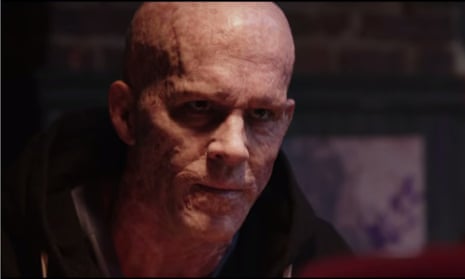Both Deadpool and Zoolander 2 make fun out of facial disfigurement. As someone with neurofibromatosis, a condition that has caused numerous non-cancerous tumours to grow on my face, I’m interested in how comedy deals with the issue.
I’m not into political correctness. Banning words and subject matters for fear of upsetting people runs the risk of stifling conversation and halting social progress. I enjoyed both films; this article isn’t designed to demonise them. I’m certain the directors Tim Miller (Deadpool) and Ben Stiller (Zoolander 2) didn’t set out to mock facial disfigurements. But both films offer an interesting insight into how mainstream comedy uses disfigurement for laughs, and what that means for those living with disfigurements and the unhelpful misconceptions they face.
We’re almost instantly acquainted with Deadpool’s disfigurement – albeit with a negative spin. A complex procedure to cure his cancer gives our hero his superpowers but leaves him afflicted by mottled, red skin. “I’ve got places to be and a face to fix,” he tells us. This reinforces one of the big myths of disfigurement, that it needs “fixing”. The subtext is that all people with disfigurements want fixing. While surgical intervention is a route some people choose to follow, many live fulfilled lives irrespective of their disfigurements.
Upon acquiring his disfigurement, Deadpool, or his alter ego Wade Wilson (Ryan Reynolds), seeks consolation from his best friend Weasel (TJ Miller), who suggests he could “star in horror movies” or “wear a mask, a really thick mask”. Again, the film is fuelling another myth here, that disfigurement is to be feared. That’s a bit strange, considering that one in every 111 people has one.
When I was at school, I had all kinds of names shouted at me in the playground. I’m in little doubt that, despite the R-rating, “Deadpool” will be added to the growing list of derisive terms at children’s disposal.
Zoolander 2’s treatment of the issue is centred on Hansel (Owen Wilson), who is left disfigured after an accident at the Derek Zoolander Institute for Kids Who Can’t Read Good and Wanna Learn to Do Other Stuff Good Too. He wears a glitzy mask to cover the injury, but becomes a hermit, living in the desert. This supports the myth that people with disfigurements are isolated and lonely, when in actual fact many people with disfigurements have great friends, wives, husbands ... and some of us even have sex. Ultimately, in probably the funniest scene in the film, Hansel’s injury turns out to be nothing more than a scratch.
This raises an interesting point: it isn’t necessarily the extent of a person’s disfigurement that determines the impact it has on their life. In fact, no such correlation exists. For shallow, vacuous Hansel, a flesh wound is devastating. He may not be the best model for those with newly acquired disfigurements struggling to cope. (Call Changing Faces instead.)
At least in Deadpool and Zoolander 2 the characters with disfigurements are the heroes – finally! Is there some lazy stereotyping? Absolutely. But the fact that both films shift away from the cliche of the baddie with a disfigurement is no small victory.
Sadly, the victory is slightly offset in Zoolander 2 by the stereotypical baddie played by Kristen Wiig, as a much-surgeried and botoxed style guru. This is disfigurement by one’s own hand, but in casting it so much as “other”, it still risks trivialising the lives of real people.
I’d say, with confidence, that nobody who saw Deadpool or Zoolander this weekend came out with any prejudice that they didn’t already go in with, whether it be against disfigurement or the comedic talents of Will Ferrell. Comedy is a beautiful thing, it lets us wrestle with the world’s issues, and as long as we use it properly and separate the fictional Deadpools from the real Adam Pearsons, then long may it live on.

